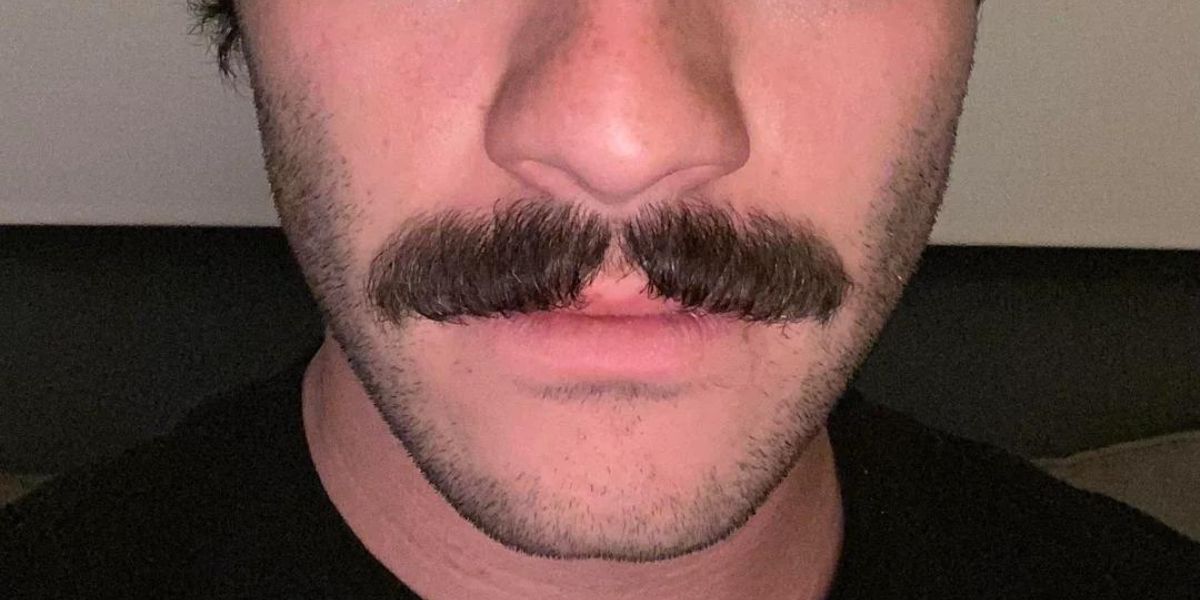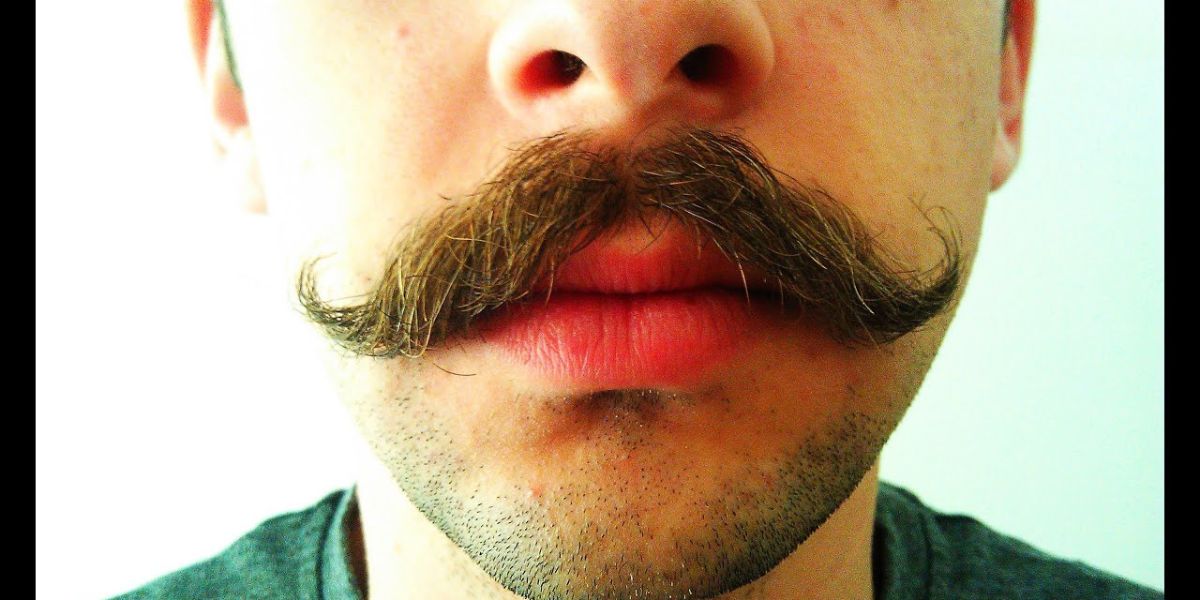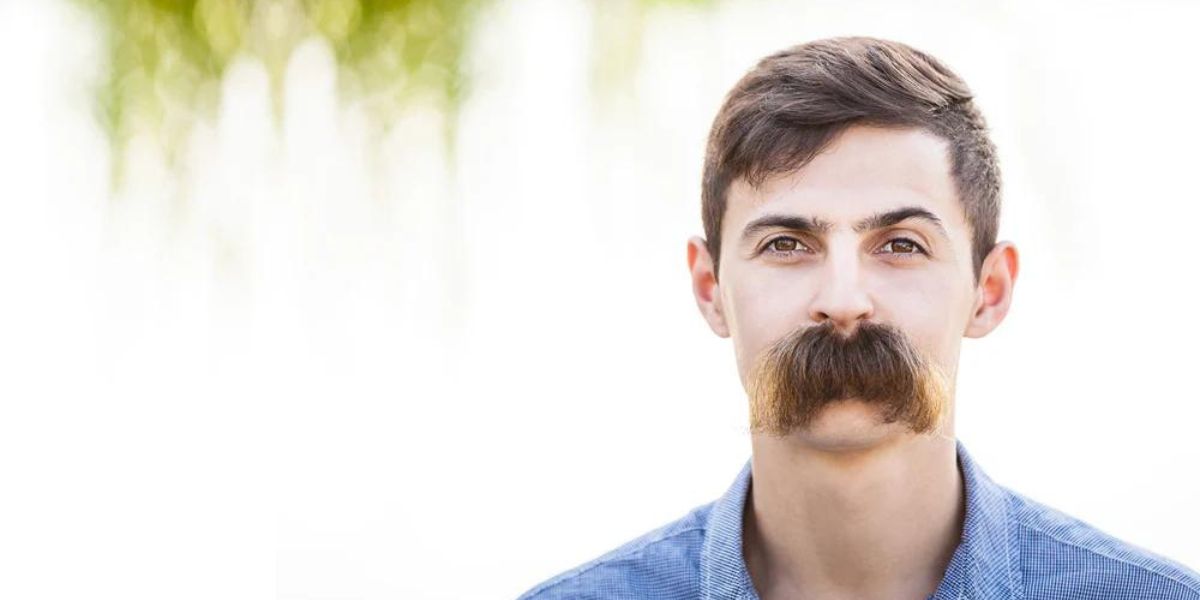Mustaches are back, and Fashion Limerence has everything you need to know about growing one. What does the process look like stage by stage? We have the information you’re looking for and can guide you through the glorious adventure of mustache growth.
Deciding to Grow a Mustache

You’ve already taken the first step: you decided to grow some whiskers on your face. You may have seen Top Gun: Maverick and realized how amazing a Stache looked on Miles Teller. You may be growing it at your significant other’s request. Whatever the case, know that you’re not alone; there are millions of men in the same boat (or plane) as you.
The Commitment of Growing a Mustache
Growing a mustache is not something one should approach lightly. Sure, some mavericks out there naturally grow the perfect Stache, but they’re one in a million. Many get professional help from barbers and even aestheticians, but who has the time or money for that anymore? Most of the remarkable Stache’s you see are the product of significant care and knowledge.
Patience is Key
Above all, patience is key as you follow the path that leads to the mustache of your dreams. Or, it’s the mustache of your SO’s dreams. Either way works. You can break down the major stages of mustache growth into:
- The beginner’s stage
- The anagen stage
- The awkward stage
- The beard dandruff stage
- The grooming stage
- The catagen stage
- The telogen stage
This list includes the three phases of hair growth: the anagen, catagen, and telogen stages. We also included phases of mustache growth that everyone experiences, such as the awkward stage, the beard dandruff stage, and the grooming stage.
Let’s take a closer look at these stages to give you an idea of what to expect from the mustache life.
The Stages of Growing a Mustache

You may be surprised at the simplicity of the routine once you get used to it. It all sounds a little daunting, but before you eject from your fighter jet, let’s take a closer look.
The Beginner’s Stage
Day zero of mustache growth is exciting for most men because it’s full of hope and potential. This is the day you finally decide to plunge into the mustache world. This is the easiest part of the process since it’s all a mental game.
Your facial hair could be anywhere from a full-grown beard to a clean-shaven face. If it’s the former, simply shave off the rest of your hair and groom appropriately, but we’re assuming you have to start from scratch if you’re reading this article.
This means you either have no mustache hair or are dissatisfied with your current Stache and want to try again. Day Zero is the satisfying day when you get to shave off whatever you need to get that upper lip bare.
Once you’re bare, though, you can put your razor away. You won’t need it for a long time if everything goes well.
The “Start-Up” phase goes through the first couple of weeks when the Stache is still short and stubbly. This is a fun look that many people enjoy, so it’s easy to pull it off.
The Anagen Stage
This is where the anagen stage of hair growth begins.
During this stage, the hair builds under itself and pushes out from the follicle. This is the occurrence with all hair growth, though the type of hair determines how long this phase can last.
The hair on your head can grow in this phase for years, whereas your facial hair’s anagen phase will most likely end within a year. The length of time and growth rate will determine your mustache length.
The Awkward Stage
After a couple of weeks, the mustache hairs will be just long enough to look weird.
When they hit that point, they seem almost out of place because of the lack of area they cover. Rather than a thick, full upper lip, you look a bit patchy.
This stage can last up to two months, but the nice part is that it looks better and better as time goes on. After several weeks, your Stache will look good enough to pass, but you still will need more time to groom or style it.
Of course, you should avoid standing by any men with full mustaches during this period.
Growing a mustache is a journey that requires commitment, patience, and a bit of knowledge. With this guide, you’ll be well on your way to sporting the mustache of your dreams.
The Beard Dandruff Stage
Not too long into growing out your mustache, you’ll begin to notice the skin under your mustache starts to itch. You must leave the itch alone; otherwise, if your skin is dry, then you’ll start to develop beard dandruff.
Beard oil and a beard brush work wonders for dry, itchy skin beneath facial hair. Apply it daily and use the beard brush instead of your fingers to scratch under your mustache. The healthy oils will moisturize the area in no time. These are also both important items for stimulating your mustache growth.
While we wish this phase ended at some point, unfortunately, it does not. The longer your beard gets, the harder it will become to keep your upper lip moisturized, so make sure to invest in the right growing and grooming products.
The Grooming Stage
After two months from Day Zero, at the earliest, your mustache will be ready to groom. While your mustache is not at its full potential, it is on the winning team. People will notice and start to compliment you on your full-looking Stache.
The reason this is called the grooming phase is that it is time to start trimming, brushing, combing, and waxing up your facial hair to turn it into a killer Stache. The hairs are much more pliable due to their increased length.
There are plenty of mustache styles to pursue, so enjoy looking through them and choosing one that fits your vibe. Your mustache will only continue to get longer and fuller for months.
The Catagen Stage
You’ve made it. Close to a year after you began growing your Stache, you have finally reached the finish line and achieved the Stache of your dreams.
This is not the beginning of the end, but it is the end of the beginning. Due to its nature, mustache hair can only grow out so far. This length is different for each person and is determined by genetics, hormone balances, and environment.
During the catagen stage, growth begins to slow down due to the regression of the hair follicle. This short stage is only a few weeks long and will be the plateau upon which your mustache sits until you decide to trim it down or shave it off.
The Telogen Stage
When the catagen stage ends, the telogen stage begins. Since facial hair is thicker and more cemented in your skin than the hair on your head, the telogen stage lasts much longer, almost three months.
During this stage, the hair ceases growth entirely, and the hair follicle it sits in rests from its work. The inactive hair eventually falls out, and the anagen phase begins again so that new hair can grow from that hair follicle.
Since the hairs in your mustache grow at different rates, some will last much longer, and others will be replaced much quicker, so your beard length will remain consistent. You don’t have to worry about it all falling out at once.
Summary
To get a believably manly mustache, you will need to pour at least two months into this process, but patience is essential. The mustache will grow thicker, fuller, and longer as time goes on, so don’t shave the whole thing off just because the awkward stage starts to get a little difficult.
Another essential element of these stages is avoiding comparison. We mentioned this earlier, but everyone is different and brings different genes and backgrounds to the table. Your mustache might not look the same as the other guy at your table, but that doesn’t make it less.
Stay on top of things. Don’t allow beard dandruff, coarse hairs, or bad trimming to ruin a perfectly good stache. Invest in the right equipment and take your facial hair to the next level. Even plenty of sleep, balanced diets, and exercise can make a world of difference.

